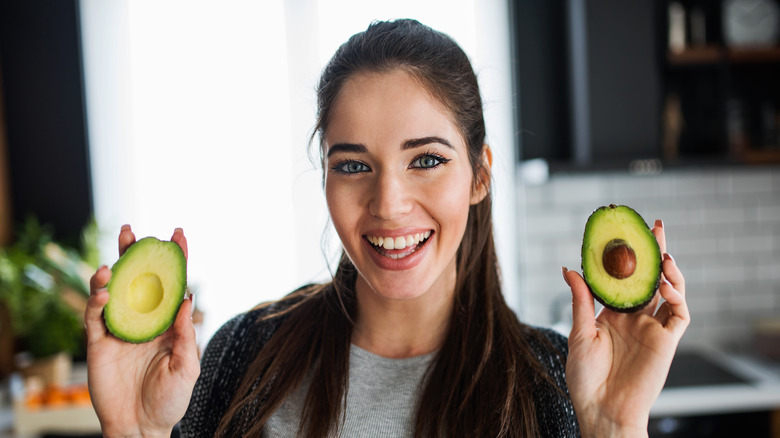What Happens To Your Muscles When You Eat Avocado Every Day
Avocado toast began trending about a decade ago, but even if you've gone keto, you'll want to keep the nutritious avocado. Avocados are technically fruits because of the large seed in the middle, and they're one of the few fruits that are a great source of heart-healthy unsaturated fats. A 100-gram serving (about half a cup) of avocado has almost 12 grams of unsaturated fats. What's more, an avocado has soluble fiber to lower cholesterol and blood sugar and insoluble fiber to aid in your digestion. Sugar? Nope, you won't find any significant amount of sugar in an avocado.
You probably won't turn to avocados as a source of protein, however, because, like any fruit, they have less than 2 grams of protein. That doesn't mean your muscles won't benefit from eating avocados, though. When your body is dehydrated, you might experience muscle cramping during a workout. Avocados have 29 milligrams of magnesium and 507 milligrams of potassium, and these electrolytes can help prevent your muscles from cramping.
Avocado help prevent muscle cramps
Endurance athletes are well familiar with muscle cramps, particularly at the end of hot races. That's because muscle cramps can occur if you're dehydrated from sweating out sodium and other electrolytes such as magnesium and potassium. You could also get muscle cramps if you're overexerting yourself. While you can get cramps on your hand, arm, or bottom of your foot, most muscle cramps occur in your calf, hamstrings, or quadriceps.
If you're experiencing muscle cramps during a workout or race, it might not make sense for you to scarf down an avocado. High-fat and high-fiber foods like avocados won't sit well with your digestive system during a workout. For the same reason, eating avocados before your workout isn't recommended to prevent cramps. Instead, you'll want to eat avocado either as your recovery meal or later in the day so your body can restore your fluid balance. If you eat avocado before you sleep, Caroline L. Young, RD, told Saatva, its potassium and magnesium will also improve your sleep.
Other health benefits of avocado
Aside from the healthy fats and electrolytes, avocados have other nutrients that can improve your health. According to a 2019 review in Antioxidants, lutein, zeaxanthin, beta-cryptoxanthin, alpha-carotene, beta-carotene, and tocopherols in avocado work together to stop the growth of cancer cells. Eating avocados every day can help your cardiovascular health by preventing cholesterol absorption and synthesis. People who consumed avocados during their meals tended to eat less and reduce their body mass index (BMI). Because avocados are low on the glycemic index, they're good for keeping your blood sugar low. Avocado oil combined with soybean can reduce inflammation and slow the deterioration of the joints.
What's great about avocados is that you can enjoy them raw and unprocessed. If you don't like avocado toast, you can add half an avocado to a berry smoothie to pack it with extra nutrition. You can also substitute a smashed avocado for your typical sandwich spread.



